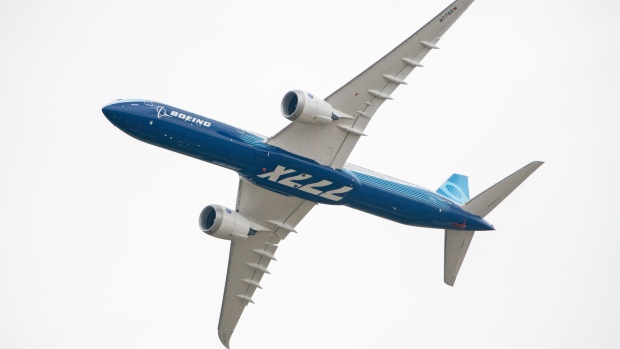Aug 29, 2023
China Airlines Studies Airbus, Boeing Widebodies to Renew Fleet
, Bloomberg News

(Bloomberg) -- China Airlines Ltd. is choosing between Boeing Co.’s yet-to-be certified 777X and the largest variant of Airbus SE’s A350 as it looks to retire existing long-haul jets, its president Kao Shing-Hwang said.
“We are looking for a new fleet” to replace the 10 Boeing 777-300ER it currently operates, Kao told Bloomberg Television in an interview. Taiwan’s main airline is exploring Boeing’s upgraded 777 or the Airbus A350-1000, Kao said, without specifying a timetable for the upgrade.
Boeing previously won a deal for 16 787-9 Dreamliners from Taiwan’s main airline. At the Paris Air Show in June, it ordered eight more jets, and converted six to the larger -10 high-capacity planes.
The US planemaker could do with a boost to a sluggish order book for its delayed 777X flagship jet, even as its smaller 787 remains popular. Airbus, meanwhile, has continued to pick up a steady stream of orders for its largest twin-aisle aircraft, most recently from Qantas Airways Ltd.
Kao said the company will have a better sense of the required units once the number of 787-10s is decided. The airline operates more than 85 aircraft, including 23 freighter jets. China Airlines’s 10 777-300ERs average about 8.3 years in age. It also flies the Airbus A350-900.
The government-backed company has benefited from higher fares as air travel comes back. Kao predicted that ticket prices will continue to rise, not least as charges mount for more sustainable flying.
China Airlines competes against two other Taiwanese carriers, Eva Airways Corp. and Starlux Airlines Co Ltd., in an increasingly competitive aviation market vying for regional and long-haul travelers. It also controls Taiwan’s only budget carrier, Tigerair Taiwan Co Ltd., which recently completed an initial public offering.
The carrier was among a few around the world that remained profitable during the coronavirus pandemic. Revenue in 2022 was just shy of its pre-pandemic levels, driven by strong air cargo sales.
Passenger flights still remain at about half of 2019 levels, and the company doesn’t expect to return to normal until 2025, Kao said.
©2023 Bloomberg L.P.


